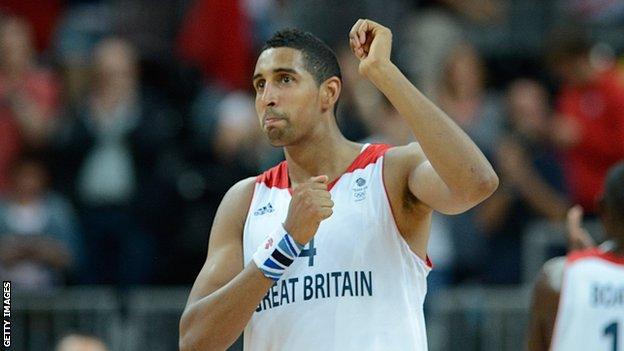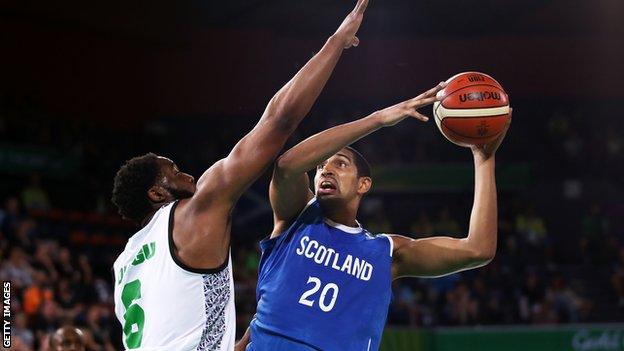Sporting Nation: Kieron Achara on the need for a 'cultural shift'
- Published
Throughout July, BBC Scotland's Sporting Nation series is reflecting on some of the greatest feats and personalities from Scottish sporting history. Here we look at basketball player Kieron Achara, who represented Great Britain at London 2012 and has clear views on how to improve diversity in sport.
"If I look at Scottish basketball, there is not a lot of diversity. If I look at other countries, that's not the case."
The issues of equality and diversity in sport and society at large have rarely been more front and centre. There is a movement happening, but whether that leads to meaningful change remains to be seen.
Kieron Achara is one of Scotland's few black Olympians and someone who has played professional basketball in five different countries.
"When I was playing in Glasgow with the Rocks, I noticed there was a lot of diversity at school level playing the sport but that isn't transferring to club level," Achara says.
"I believe there are barriers. It's not just a race thing, it's about social status, low incomes and such like. If you look at sports clubs, you are paying your direct debit of £40 or £50 a month. Then parents have to drive their children to sessions because facilities aren't easily accessible.
"It's not the case that kids from the BAME community aren't interested in sport. Only once we get to the stage of understanding that barriers are there we can knock them down."
'It's the more affluent kids who are making it'
The former Scotland and Great Britain captain believes those barriers are derailing the best endeavours of sporting authorities.
"It's the more affluent people who are making it to the next level. You can see it in football, which used to be a working-class sport. There's been a culture shift there too.

Achara represented Great Britain at the 2012 London Olympics
"We set up events at Basketball Scotland and call them inclusive events, but they're not because a lot of people can't make it to them.
"Schools are a great place to start. Imagine if you had a system where you don't get to play if you don't go to school and where if you are struggling educationally, your club helps pay for tutors and so on."
'In Scotland we need a cultural shift'
Achara's goal is to earn a position of influence on the board of a sporting body to help enforce these changes. He points to the system in the United States, where he attended Duquesne University in Pittsburgh on a basketball scholarship in 2003.
"In the United States you can play baseball in spring or summer, soccer in the summer, then American football and basketball. You can play three or four sports at school and excel at them all.
"It's not until you are 15 or 16 you need to decide which one you want to stick with. Here we we have kids at eight years old being told to choose between one sport or another.
"We have children at the age of 10 having trials and being told they are not good enough to play the sport they love. It doesn't make any sense. In Scotland, we need a cultural shift."
'I have embraced my uniqueness'
If the status quo stifles talent, and in particular people from disadvantaged backgrounds, how did Achara make it as a professional athlete?
"I just got lucky I suppose. Basketball didn't come into my life till I was 13 or 14. I played lawn bowls and football before that. They put me in goals or at centre-half when I wanted to play up front, so I quit football.

Achara captained Scotland at the 2018 Commonwealth Games
"I was growing so fast I was uncoordinated, I couldn't walk with the pain. I grew four inches over one summer.
"When I was 16, I got invited to a camp the United States, I'd only been playing for a year-and-a-half and it was more of a hobby than anything else. Growing up on the council estate in Stirling, my dream was to go to university.
"This coach said to me if I worked hard I could get a scholarship - I had no idea what that was. I ended up going to a university in Pittsburgh, I knew nothing about college basketball or the NBA or anything.
"When I was growing up being black and being 6ft 8in wasn't one of the things you embraced at all. You just wanted to do what it took to fit in, but I didn't. It was very uncomfortable at times, but basketball allowed me to be unique and stand out.
"For the first time in my life I was proud to be who I was because of that. That is what sport helped me to be. I was the tall freak growing up but I turned into the tall athlete. I have embraced my uniqueness."